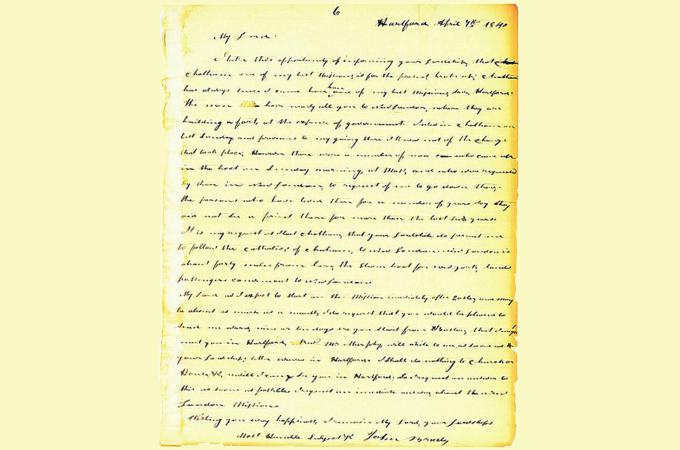An early mission in Connecticut
On April 7, 1840, Father John Brady wrote to Bishop Benedict J. Fenwick of Boston, requesting permission to abandon a mission in Chatham, Connecticut, and accede to the request of the congregation by following it to New London.
The first European settlers arrived in Chatham during the 1650s, drawn there by the brownstone, which could be quarried and conveniently shipped down the Connecticut River on which the town resided. Related industries, such as shipbuilding, soon appeared, and by the mid-19th century, local brownstone was being shipped as far as San Francisco and England. The area was originally named East Middletown, then in 1767, incorporated as Chatham, and in 1841, as Portland. The last change also created the towns of East Hampton and Middle Haddam, which had been part of Chatham.
The Catholic community in Connecticut developed slower than in Massachusetts and Rhode Island, correlating with the development of industry and, therefore, jobs. By the 1820s, predominantly Irish Catholic immigrants had arrived in significant numbers and, by the end of the decade, Catholic settlements were reported at Hartford, New Haven, New London, Middletown, and Bridgeport.
By 1836, a few years before Father Brady's letter, there were about 150 Catholics in the Chatham area. As with many early New England missions, most of the congregation was likely unmarried men who moved as jobs became available, in this case quarrying, but other common examples from the time include canal and railroad work.
Father Brady was an experienced missionary priest who, following his 1833 ordination, spent nearly two years based in a Claremont, Vermont, mission serving the eastern half of the state. Recalled in 1835, he was then sent to southeastern Massachusetts, serving two small churches in Sandwich and New Bedford, and a mission based in Wareham. He had arrived at the Hartford, Connecticut, based mission in August 1837, succeeding Father James Fitton and, briefly, Father Peter Brady.
In his April, 1840, letter, Father Brady writes that "Chatham has always been since I came here one of my best missions, save Hartford," but he was unaware until his visit the previous Sunday that most of the community had departed. While celebrating Mass, some of the men who formerly resided there returned by boat to inform him that "the men have nearly all gone to New London, where they are building a fort ..." and wished for him to follow.
The fort in question is Fort Trumbull, now part of Fort Trumbull State Park, constructed between 1839 and 1852 to defend the city's harbor. Bishop John Cheverus, the first bishop of Boston, had visited New London in June 1823, and the following year Father William Taylor, interim administrator of the diocese, did likewise. According to the Chatham men, the area had not been visited by a priest for nearly two years, the last probably being Father Fitton when the city was described "a bigoted place where (he) ... found it no uncommon experience to be hooted and even stoned by the street urchins."
Father Brady continues, writing to Bishop Fenwick "it is my request as I lost Chatham, that your Lordship do permit me to follow the Catholics of Chatham, to New London." He writes that New London is about 40 miles distant, and the boat, which departs for Newport, Rhode Island, can take him there; he hopes to leave for that place immediately after Easter. He concludes urging Bishop Fenwick's immediate reply and asks him to send notice in advance of his next visit to Hartford so he can be present to discuss the prospect of a mission in New London and, until that time, he will not pursue the acquisition of a church or residence in that city.
Father Brady served the Hartford mission for a total of 17 years, the Catholic community there flourishing under his leadership. In 1843, he built new churches in Middletown and New London, and the following year Norwich. He also founded new missions in New Britain, Meridan and Stamford.
According to The Pilot from the time, Father Brady died on Nov. 16, 1854, in Hartford, following a brief illness.
- Thomas Lester is the archivist of the Archdiocese of Boston.



















